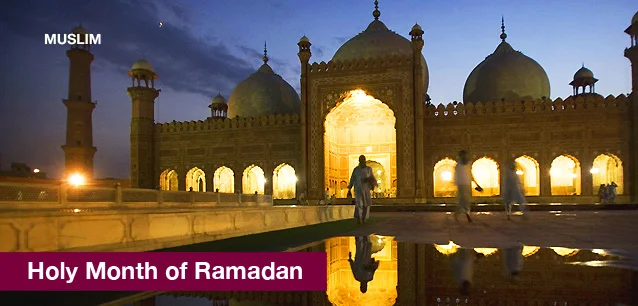 AD
AD
Today is: December 16
Scroll to explore events active on this date.
Additional Events on LEEP
LEEP INK FEATURES

August? Absolutely!
In August, we live through the Dog Days of Summer. It's hot and often humid, and those who can leave for better climates do. Down south, winter is in full force. August is also known as "the ...

In The Heat of July: July 2025 Events
Is it hot enough (or cold enough if you're below the equator) for you yet? There is actually a day for that! Like every month, I pick a diverse collection of events you may or may not know about. This ...

May Blooms: Events in May 2025
Along with October, May is one of the most densely packed months of the year. It's before the summer humidity and the last whole month of the school year. The weather is warming in t...
About the Muslim Holy Month of Ramadan
Food , Family & Friends
Ends: Apr 08, 2024
DESCRIPTION:
The Islamic holy month of Ramadan begins today at sundown for most Muslims and for Shi'ite Muslims on the next day. For those doing business with the Islamic world, many businesses will close or have shortened hours. Muslim employees in Muslim majority countries typically work six hours or less during Ramadan. Most activity takes place at night, not during the day, and government offices can be closed for up to three weeks leading into and through the Eid al-Fitr holiday following.
About Ramadan
The holy month of Ramadan is the ninth month of the Islamic lunar calendar and considered the most sacred. In the Qu'ran, the holy book of Islam, fasting during the month is one of the five pillars of the faith. Ramadan, Muslims believe, is the month in which the totality of the Qu'ran was revealed to prophet Mohammed by God (Allah).
The month officially begins when the mufti in Mecca declares it has begun and has seen the crescent moon (Hilāl) on the horizon. Therefore, it may fall a day before or after what we are noting.
Fasting (Fardh) begins before sunrise after the first meal called Suhoor. Fasting continues until sunset and is broken with a meal called Iftar. The fasting continues for 30 days. Each year Ramadan falls 11 days earlier in the Gregorian Calendar.
During the fast, devout Muslims abstain from food, drink (including water), smoking and sex during daylight hours, as well as negative activities including gossip, to focus on their relationship with God and strengthen their faith. The only people exempt from the fast are young children, the ill, travelers, diabetics and breastfeeding or menstruating women. Menstruating women and travelers are required to make up missed fasting later in the year.
Charity to and in service of others is a big part of Ramadan. Many global charities will offer matching funds to increase the impact of charitable giving during the month. Prayers (Salat) are increased, and reading the Qu'ran is visible everywhere in Muslim majority nations.
The 3 Phases of Ramadan
Each week of Ramadan has different significance, with the last 10 days being the most holy. The first 10 days are known as the Days of Mercy. During this time observant Muslims pray for God’s mercy and forgiveness for any transgressions they have committed.
The second 10 Days are known as the Days of Forgiveness. During these days observant Muslims pray for God’s forgiveness and work to change their ways (repent) from any thoughts or actions that have lead them astray.
The last 10 days are devoted to worship of God and deliverance from evil, (hellfire) and considered the most holy.
These include Laila-tul-Qadr, which the Qu'ran states is the most powerful night of the year. It is the night when all good deeds and devotions are magnified.
Fasting is believed to cleanse the soul and inspire a fear of God (Taqwa). It is a common practice within nearly every faith.
——————————
Non-Muslims living or traveling
in the Islamic World during Ramadan
Non-Muslims living in most Muslim majority countries are required to observe fasting laws in public, but exempt in private. Most companies in the Muslim world will have a room set aside for non-Muslim employees and exempt people where they can drink coffee, tea and water, eat and socialize without disturbing those observing the fast. Non-Muslim employees usually work full days for the entire month.
Traveling is a little more difficult. Non-Muslims traveling through Muslim majority countries will often find no services during daylight hours and public fasting laws strictly enforced in public spaces, including airports. Outside of some premium airport lounges in select countries, the blackout of services in all public spaces is enforced, particularly in the GCC.
It’s advisable to make dinner reservations at popular restaurants in Muslim majority countries during Ramadan. Most will not open until after sundown and Iftar dinners, especially on Friday nights, are equivalent in size and celebration to Christmas or Thanksgiving dinner in other parts of the world.
Some countries and cities where alcohol is available at other times of the year will suspend all sales of liquor during Ramadan. Other countries with Muslim minorities, like Sri Lanka, may suspend the sale of liquor during specific days of Ramadan and the Eid celebration that follows. This is common in Buddhist societies; it is a sign of respect.
For non-Muslims traveling to or through Asia, North Africa or the Middle East during or immediately following Ramadan, it is advisable to check with your hotels ahead of time to find out if they support any specific traditions and adjust your travel plans or expectations accordingly.
VIDEOS
SUPPORTING DOCUMENTS
ADDITIONAL IMAGES
Where would you like to go now?
 AD
AD






/footer-logo.svg)
